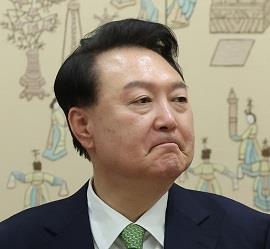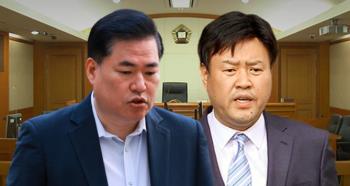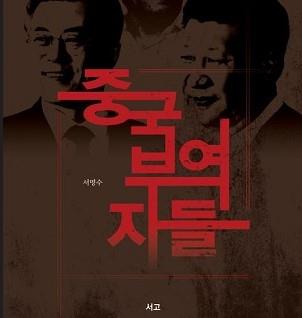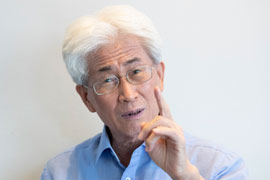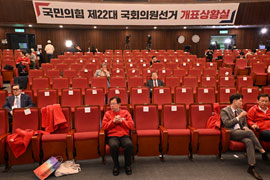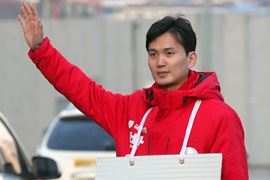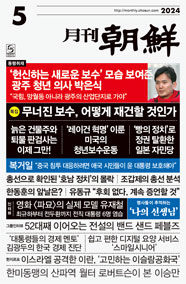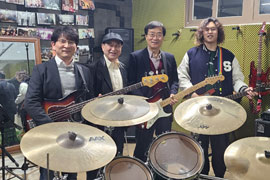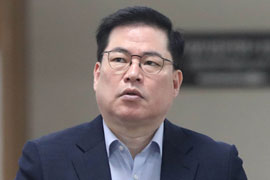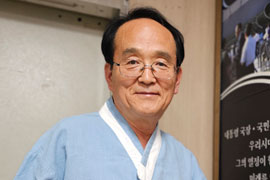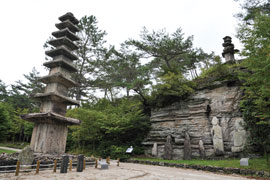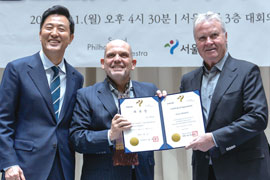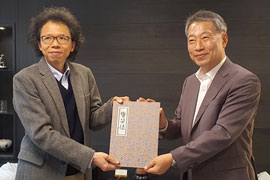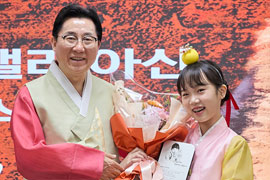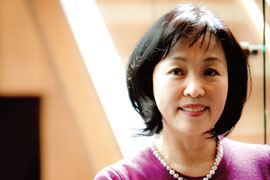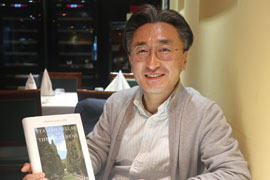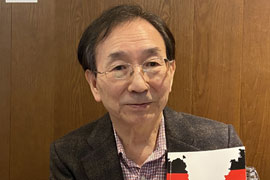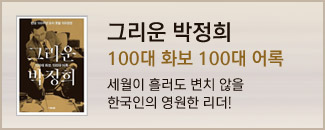Frederick Douglass Speaks at Dedication of the Freedmen’s Monument(April 14, 1876)
“He knew the American people better than they knew themselves, and his truth was based upon this knowledge.”
번역·해설 李 南 圭 디지틀조선 편집위원·前조선일보 외신부장·駐美 특파원
▲ 프레드릭 더글러스(1817~1895) 노예제도 폐지 운동가. 어머니가 흑인 노예였고, 아버지는 농장 주인인 백인으로 알려져 있다.
연설의 배경:1876년 4월 14일, 워싱턴시에서 에이브러햄 링컨을 기념하는 입상 조각 봉헌식이 거행되었다. 흑인이 무릎을 꿇고 링컨을 올려다보고 있는 모습을 한 이 조각은 그가 포드 극장에서 암살된 지 11년 후, 해방된 노예들이 그에게 감사를 표시하기 위해 모금한 1만7천달러로 만든, 조각가 토마스 볼의 작품이다. 당시 그랜트 대통령과 고관들이 참석한 가운데 벌어진 이 식전에서 프레드릭 더글러스라는 흑인이 미국 역사에 남게 된 감동적인 연설을 했다.
1817년, 메릴랜드에서 백인 아버지와 노예 어머니 사이에서 태어난 더글러스는 21세 때 뉴욕으로 탈출, 노예제도 폐지 운동 지도자가 되었다. 더글러스란 이름도 체포를 피하기 위해 사용한 가명이다. 그는 한때 검거를 피해 영국으로 도피하기도 했지만, 남북전쟁중 흑인 병사를 모병하는 등 링컨 대통령에게 협조했고, 그의 취임 축하연에 초청까지 받게 되었다. 그러나 당시 미국 사회에서는 여전히 흑인에 대한 차별이 뿌리 깊었기 때문에 그는 入場(입장)을 거부당했고, 링컨이 손수 문까지 나가서 그를 마중했다는 일화가 남아 있다.
더글러스는 이 봉헌식에서 링컨을 무조건 찬양하는 대신, 일단 그를 「백인 대통령」이고, 모범도 아니라고 선언해서 참석한 사람들에게 충격을 주고, 그 증거를 열거한 다음, 그럴 수밖에 없었던 상황을 설명하다가, 위대한 인간애를 가진 사람이었다는 결론을 내린다. 이런 방식은 그가 1852년 뉴욕주 로체스터의 독립기념식 연설에서 개국 선조를 찬양하다가, 갑자기 그들의 위선적인 노예제도를 공격한 뒤, 희망을 고취하는 결론으로 끝냈던 스타일을 연상시킨다.
그의 연설은 미사여구를 사용하지 않고, 사실을 담담하게 나열하고 반복하고 대조시킴으로써 감동을 일으킨다. 노예제도는 공식적으로 폐지되었지만, 흑인과 백인과의 사이가 원만치 못했던 시기에 나온 이 연설은 두 인종간의 대립과 갈등을 화해시키는 데 중요한 역할을 한 역사적 작품으로 평가되고 있다.
링컨의 「해방자」 조각은 지금도 워싱턴시 한복판, 11가와 13가 사이의 링컨 공원에 서 있다.
Fellow citizens, in what we have said and done today, and in what we may say and do hereafter, we disclaim everything like arrogance and assumption. We claim for ourselves no superior devotion to the character, history, and memory of the illustrious name whose monument we have here dedicated today. We fully comprehend the relation of Abraham Lincoln both to ourselves and to the white people of the United States. Truth is proper and beautiful at all times and in all places, and it is never more proper and beautiful in any case than when speaking of a great public man whose example is likely to be commended for honor and imitation long after his departure to the solemn shades, the silent continents of eternity. It must be admitted, truth compels me to admit, even here in the presence of the monument we have erected to his memory, Abraham Lincoln was not, in the fullest sense of the word, either our man or our model. In his interests, in his associations, in his habits of thought, and in his prejudices, he was a white man.
He was preeminently the white man’s president, entirely devoted to the welfare of white men. He was ready and willing at any time during the first years of his administration to deny, postpone, and sacrifice the rights of humanity in the colored people to promote the welfare of the white people of this country. In all his education and feeling he was an American of the Americans. He came into the presidential chair upon one principle alone, namely, opposition to the extension of slavery. His arguments in furtherance of this policy had their motive and mainspring in his patriotic devotion to the interests of his own race. To protect, defend, and perpetuate slavery in the states where it existed Abraham Lincoln was not less ready than any other president to draw the sword of the nation. He was ready to execute all the supposed constitutional guarantees of the United States Constitution in favor of the slave system anywhere inside the slave states. He was willing to pursue, recapture, and send back the fugitive slave to his master, and to suppress a slave rising for liberty, though his guilty master were already in arms against the government. The race to which we belong were not the special objects of his consideration. Knowing this, I concede to you, my white fellow citizens, a preeminence in this worship at once full and supreme. First, midst, and last, you and yours were the objects of his deepest affection and his most earnest solicitude. You are the children of Abraham Lincoln. We are at best only his stepchildren―children by adoption, children by force of circumstances and necessity. To you it especially belongs to sound his praises, to preserve and perpetuate his memory, to multiply his statues, to hang his pictures high upon your walls, and commend his example, for to you he was a great and glorious friend and benefactor. Instead of supplanting you at this altar, we would exhort you to build high his monuments; let them be of the most costly material, of the most cunning workmanship; let their forms be symmetrical, beautiful, and perfect; let their bases be upon solid rocks, and their summits lean against the unchanging blue, overhanging sky, and let them endure forever! But while in the abundance of your wealth, and in the fullness of your just and patriotic devotion, you do all this, we entreat you to despise not the humble offering we this day unveil to view; for while Abraham Lincoln saved for you a country, he delivered us from a bondage, according to Jefferson, one hour of which was worse than ages of the oppression your fathers rose in rebellion to oppose.
Fellow citizens, ours is no newborn zeal and devotion―merely a thing of this moment. The name of Abraham Lincoln was near and dear to our hearts in the darkest and most perilous hours of the Republic. We were no more ashamed of him when shrouded in clouds of darkness, of doubt, and defeat than when we saw him crowned with victory, honor, and glory. Our faith in him was often taxed and strained to the uttermost, but it never failed. When he tarried long in the mountain; when he strangely told us that we were the cause of the war; when he still more strangely told us to leave the land in which we were born; when he refused to employ our arms in defense of the Union; when, after accepting our services as colored soldiers, he refused to retaliate our murder and torture as colored prisoners; when he told us he would save the Union if he could with slavery; when he revoked the Proclamation of Emancipation of General Fr♥mont; when he refused to remove the popular commander of the Army of the Potomac, in the days of its inaction and defeat, who was more zealous in his efforts to protect slavery than to suppress rebellion; when we saw all this, and more, we were at times grieved, stunned, and greatly bewildered; but our hearts believed while they ached and bled. Nor was this, even at that time, a blind and unreasoning superstition. Despite the mist and haze that surrounded him; despite the tumult, the hurry, and confusion of the hour, we were able to take a comprehensive view of Abraham Lincoln, and to make reasonable allowance for the circumstances of his position….
Though he loved Caesar less than Rome, though the Union was more to him than our freedom or our future, under his wise and beneficent rule we saw ourselves gradually lifted from the depths of slavery to the heights of liberty and manhood;under his wise and beneficent rule, and by measures approved and vigorously pressed by him, we saw that the handwriting of ages, in the form of prejudice and proscription, was rapidly fading away from the face of our whole country; under his rule, and in due time, about as soon after all as the country could tolerate the strange spectacle, we saw our brave sons and brothers laying off the rags of bondage, and being clothed all over in the blue uniforms of the soldiers of the United States; under his rule we saw two hundred thousand of our dark and dusky people responding to the call of Abraham Lincoln, and with muskets on their shoulders, and eagles on their buttons, timing their high footsteps to liberty and union under the national flag; under his rule we saw the independence of the black republic of Haiti, the special object of slaveholding aversion and horror, fully recognized, and her minister, a colored gentleman, duly received here in the city of Washington; under his rule we saw the internal slave trade, which so long disgraced the nation, abolished, and slavery abolished in the District of Columbia; under his rule we saw for the first time the law enforced against the foreign slave trade, and the first slave trader hanged like any other pirate or murderer;under his rule, assisted by the greatest captain of our age, and his inspiration, we saw the Confederate States, based upon the idea that our race must be slaves, and slaves forever, battered to pieces and scattered to the four winds; under his rule, and in the fullness of time, we saw Abraham Lincoln, after giving the slaveholders three months’ grace in which to save their hateful slave system, penning the immortal paper, which, though special in its language, was general in its principles and effect, making slavery forever impossible in the United States. Though we waited long, we saw all this and more….
I have said that President Lincoln was a white man, and shared the prejudices common to his countrymen towards the colored race. Looking back to his times and to the condition of his country, we are compelled to admit that this unfriendly feeling on his part may be safely set down as one element of his wonderful success in organizing the loyal American people for the tremendous conflict before them, and bringing them safely through that conflict. His great mission was to accomplish two things; first, to save his country from dismemberment and ruin; and second, to free his country from the great crime of slavery. To do one or the other, or both, he must have the earnest sympathy and the powerful cooperation of his loyal fellow countrymen. Without this primary and essential condition to success his efforts must have been vain and utterly fruitless. Had he put the abolition of slavery before the salvation of the Union, he would have inevitably driven from him a powerful class of the American people and rendered resistance to rebellion impossible. Viewed from the genuine abolition ground, Mr. Lincoln seemed tardy, cold, dull, and indifferent; but measuring him by the sentiment of his country, a sentiment he was bound as a statesman to consult, he was swift, zealous, radical, and determined.
Though Mr. Lincoln shared the prejudices of his white fellow countrymen against the Negro, it is hardly necessary to say that in his heart of hearts he loathed and hated slavery. The man who could say, “Fondly do we hope, fervently do we pray, that this mighty scourge of war shall soon pass away, yet if God wills it continue till all the wealth piled by two hundred years of bondage shall have been wasted, and each drop of blood drawn by the lash shall have been paid for by one drawn by the sword, the judgments of the Lord are true and righteous altogether,” gives all needed proof of his feeling on the subject of slavery. He was willing, while the South was loyal, that it should have its pound of flesh, because he thought that it was so nominated in the bond; but farther than this no earthly power could make him go.
Fellow citizens, whatever else in this world may be partial, unjust, and uncertain, time, time! is impartial, just, and certain in its action. In the realm of mind, as well as in the realm of matter, it is a great worker, and often works wonders. The honest and comprehensive statesman, clearly discerning the needs of his country, and earnestly endeavoring to do his whole duty, though covered and blistered with reproaches, may safely leave his course to the silent judgment of time. Few great public men have ever been the victims of fiercer denunciation than Abraham Lincoln was during his administration. He was often wounded in the house of his friends. Reproaches came thick and fast upon him from within and from without, and from opposite quarters. He was assailed by abolitionists;he was assailed by slaveholders; he was assailed by the men who were for peace at any price; he was assailed by those who were for a more vigorous prosecution of the war; he was assailed for not making the war an abolition war; and he was most bitterly assailed for making the war an abolition war.
But now behold the change; the judgment of the present hour, that taking him for all in all, measuring the tremendous magnitude of the work before him, considering the necessary means to ends, and surveying the end from the beginning, infinite wisdom has seldom sent any man into the world better fitted for his mission than Abraham Lincoln….
Upon his inauguration as president of the United States, an office, even where assumed under the most favorable conditions, fitted to tax and strain the largest abilities, Abraham Lincoln was met by a tremendous crisis. He was called upon not merely to administer the government but to decide, in the face of terrible odds, the fate of the Republic.
A formidable rebellion rose in his path before him; the Union was already practically dissolved; his country was torn and rent asunder at the center. Hostile armies were already organized against the Republic, armed with the munitions of war which the Republic had provided for its own defense. The tremendous question for him to decide was whether his country should survive the crisis and flourish, or be dismembered and perish. His predecessor in office had already decided the question in favor of national dismemberment, by denying to it the right of self-defense and self-preservation―a right which belongs to the meanest insect.
Happily for the country, happily for you and for me, the judgment of James Buchanan, the patrician, was not the judgment of Abraham Lincoln, the plebeian. He brought his strong common sense, sharpened in the school of adversity, to bear upon the question. He did not hesitate, he did not doubt, he did not falter; but at once resolved that at whatever peril, at whatever cost, the union of the states should be preserved. A patriot himself, his faith was strong and unwavering in the patriotism of his countrymen. Timid men said before Mr. Lincoln’s inauguration, that we had seen the last president of the United States. A voice in influential quarters said, “Let the Union slide.” Some said that a Union maintained by the sword was worthless. Others said a rebellion of eight million cannot be suppressed; but in the midst of all this tumult and timidity, and against all this, Abraham Lincoln was clear in his duty, and had an oath in heaven. He calmly and bravely heard the voice of doubt and fear all around him; but he had an oath in heaven, and there was not power enough on the earth to make this honest boatman, backwoodsman, and broad-handed splitter of rails evade or violate that sacred oath. He had not been schooled in the ethics of slavery; his plain life had favored his love of truth. He had not been taught that treason and perjury were the proof of honor and honesty. His moral training was against his saying one thing when he meant another. The trust which Abraham Lincoln had in himself and in the people was surprising and grand, but it was also enlightened and well founded. He knew the American people better than they knew themselves, and his truth was based upon this knowledge….
Fellow citizens, I end, as I began, with congratulations. We have done a good work for our race today. In doing honor to the memory of our friend and liberator, we have been doing highest honors to ourselves and those who come after us; we have been fastening ourselves to a name and fame imperishable and immortal; we have also been defending ourselves from a blighting scandal. When now it shall be said that the colored man is soulless, that he has no appreciation of benefits or benefactors; when the foul reproach of ingratitude is hurled at us, and it is attempted to scourge us beyond the range of human brotherhood, we may calmly point to the monument we have this day erected to the memory of Abraham Lincoln.
동포 여러분, 우리는 오늘 우리가 한 말이나 행동에서, 그리고 앞으로 우리가 할 말과 행동에서도 오만이나 가정 같은 것은 모두 내버릴 것입니다. 또 오늘 봉헌하려는 기념물 주인공의 인격과 역사, 그리고 빛나는 이름에 대해서 남다른 찬사를 덧붙이지도 않겠습니다. 우리는 에이브러햄 링컨과 우리들, 그리고 미국 백인간의 관계를 너무나 잘 알고 있습니다.
진실은 어느 곳에서든지 항상 적절하고 아름다운 것입니다. 그리고 엄숙한 어둠의 땅, 다시 말해서 침묵과 영원의 대륙으로 떠난 지 오랜 뒤에도, 명예와 모범의 대상으로 추앙되는 위대한 정치인에 대해서 언급하는 것보다 더 적절하고 아름다운 일은 없을 것입니다. 우리는 우리가 세운 기념물 앞에서조차도, 진실은 에이브러햄 링컨이 단어 그대로의 의미에서는 우리편이거나 모범이 아니었다는 사실을 시인하지 않을 수 없게 만들고 있다는 것을 인정해야 합니다. 이해 관계, 交遊(교유) 관계, 사고 방식 그리고 편견 등에서 그는 백인이었습니다.
그는 무엇보다도 백인의 대통령이었고, 백인의 복지를 위해 진력했습니다. 그는 대통령 취임 첫해 동안, 항상 이 나라에 사는 백인의 복지를 증진시키기 위해 유색 인종의 인권을 부정하고, 연기하고, 희생시키려 했습니다. 그가 받은 교육이나 사상을 고려할 때 그는 전형적인 미국인이었습니다.
그는 단 한 가지 주장, 즉 노예제도 연장 반대만 내걸고 대통령의 자리에 올랐습니다. 이 정책을 발전시킨 그의 논리는 자기가 속해 있는 인종의 이익에 부응하려는 애국심에서 출발했고, 또 거기에 동기가 있었습니다. 에이브러햄 링컨은 다른 대통령 못지 않게, 노예제도가 존재했던 주에서 그것을 보호하고, 지키고, 영속시키기 위해 주저 없이 국가 권력을 사용했습니다.
그는 미국 헌법에 보장되어 있는 모든 규정을 사용하여 노예제도가 있는 주에서 그 제도를 유지하려는 생각을 가지고 있었습니다. 그는 도망한 노예를 추적하고 체포해서 원주인에게 돌려주고, 자유를 쟁취하려는 노예 봉기를 탄압하려고 했습니다. 법을 어긴 노예 주인이 이미 정부에 대항해서 무기를 들었는데도 말입니다.
우리들의 인종은 그의 특별한 고려 대상이 아니었습니다. 백인 동포 여러분, 저는 이런 사정을 알고 있기 때문에 확신을 가지고 강조합니다. 무엇보다도 여러분은 모두가 그의 가장 깊은 애정과 가장 진지한 배려의 대상이었습니다. 여러분은 에이브러햄 링컨의 아이들입니다.
우리는 기껏해야 입양되거나, 상황과 필요에 의해서 만들어진 의붓자식일 뿐입니다. 여러분에게는 그를 찬양하는 말을 하고, 그의 기억을 영원히 보존하고, 그의 立像을 많이 만들고, 그의 사진을 벽에 높이 걸고, 그의 행동을 칭찬하는 일이 어울립니다. 여러분에게는 그가 위대하고 영광스러운 친구이며 시혜자이기 때문입니다. 우리는 여러분에게 이 제단 대신 높다란 기념물을 세우라고 권유하고 싶습니다.
가장 값비싼 자재를 쓰고, 가장 정교한 솜씨를 사용해서 말입니다. 그 모양은 대칭적이고, 아름다우며, 완벽해야 합니다. 기초는 단단한 바위 위에 올려놓아야 하고, 그 頂上은 변함 없이 푸른 하늘로 솟아야 합니다. 그리고 영원히 보존되어야 합니다!
그러나 비록 여러분이 엄청난 돈을 들여, 정의감이나 애국심에 가득 차서 이 일을 한다고 해도, 우리가 오늘 보여드리는 이 볼품 없는 제물을 무시하지 마십시오. 에이브러햄 링컨은 여러분을 위해서 나라를 구했지만, 우리를 구속으로부터 해방시켜주었기 때문입니다. 제퍼슨은 한 시간의 구속은 수십 년 간의 탄압보다 더 나쁜 것이라고 말했습니다. 그리고 여러분의 선조들은 그 탄압에 항거하여 봉기했습니다.
동포 여러분, 우리가 가지고 있는 것은 새로 태어난 열정이나 신앙심이 아니라, 이 순간의 사물일 뿐입니다. 에이브러햄 링컨의 이름은 이 나라가 가장 어둡고 파멸적인 상황에 빠져 있었을 때, 우리 가슴 가까이 있던 소중한 존재였습니다.
그가 어둠의 구름과 의혹에 가려지고 패배를 당했을 때도, 우리는 승리와 명예와 영광을 누리던 때와 마찬가지로, 그를 부끄러워하지 않았습니다. 그에 대한 믿음이 흐려져 한계에 달했던 때는 여러 번 있었지만, 완전히 포기한 적은 한번도 없었습니다.
그가 산 속에서 오랫동안 머물고 있었을 때, 우리가 전쟁의 원인이라고 이해할 수 없는 말을 했을 때, 우리더러 태어난 땅에서 떠나라고 명령했을 때, 북부를 위해 총을 잡겠다는 우리 요청을 거절했을 때, 우리 병사를 유색인 부대로 받아들인 다음에도 그들이 포로가 되면 고문을 하고 살인한 자들에게 보복하기를 거절했을 때, 가능하면 노예제도와 함께 연방을 유지하고 싶다고 말했을 때, 프레몽 장군의 노예해방선언을 번복했을 때, 전투를 피하고 패배를 거듭하면서, 남군을 패배시키기보다는 노예제도를 유지하려는 데 더 열심이었던 인기 있는 포토맥군 사령관을 해임하기를 거절했을 때도 말입니다.
우리는 이런 것과 그 밖의 다른 일들을 보면서, 때로는 슬퍼했고, 경악하고, 당황했습니다. 그러나 우리들의 심장은 아픔을 느끼고, 피를 흘리면서도 믿음을 잃지 않았습니다. 그러면서도 그것은 맹목적이고 비이성적인 미신은 아니었습니다. 그를 둘러싸고 있던 안개와 구름에도 불구하고, 당시의 소란과 촉박한 상황과 혼란에도 불구하고, 우리는 에이브러햄 링컨을 전체적인 모습으로 바라볼 수 있었고, 그가 처해 있는 상황을 이해할 수 있었습니다….
그는 시저보다는 로마를 사랑했지만, 우리들의 자유나 미래보다 연방을 더 중요하게 생각했지만, 그의 현명하고 훌륭한 통치 아래서 우리는 노예제도의 구렁텅이로부터 점차 자유와 인간성의 고지로 올라갈 수 있었습니다.
그의 현명하고 훌륭한 통치 아래서, 그리고 그가 승인하고 정열적으로 추진한 조처에 따라서, 편견과 박탈이라는 낡은 단어가 온 나라로부터 급속히 사라지고 있는 것을 보았습니다.
그의 통치 아래서, 이 나라가 그 기묘한 구경거리에 익숙해진 지 얼마 후 적당한 시기에, 우리 용감한 아들과 형제들이 구속이라는 누더기를 벗어버리고, 미합중국 병사의 푸른 제복으로 완전히 갈아입은 것을 보았습니다.
우리는 그의 통치 아래서 20만 명이나 되는 검은 피부를 가진 사람들이 에이브러햄 링컨의 요청에 호응해서, 머스킷 소총을 어깨에 메고, 독수리 버튼이 달린 제복을 입고, 국기 아래서 자유와 통일을 향해서 힘차게 보조를 맞추는 것을 보았습니다.
우리는 그의 통치 아래서 노예제도를 위해 특별히 만들어진 혐오와 공포의 흑인국이 아이티공화국으로 독립하는 것을 보았습니다. 이 나라의 유색인 수상은 워싱턴시에서 정식으로 환영을 받았습니다. 우리는 그의 통치 아래서 이 나라의 명예를 오랫동안 더럽혀온 국내 노예매매제도가 폐지되고, 워싱턴시에서 노예제도가 폐지된 것을 보았습니다.
우리는 그의 통치 아래서 처음으로 외국의 노예 무역을 금지하는 법이 시행되고, 첫 노예 무역 업자가 해적이나 살인자와 마찬가지로 교수형을 받게 된 것을 보았습니다. 우리는 그의 통치 아래서 우리 시대의 가장 위대한 선장과 그의 靈感의 도움을 받아, 우리 인종은 노예가 되어야 하고, 또 영원히 노예이어야 한다는 사상 위에 수립된 남부주가 산산조각이 나서 바람에 흩어진 것을 보았습니다.
우리는 그의 통치 아래서, 그리고 시간이 흐름에 따라, 에이브러햄 링컨이 노예 소유자들에게 그 증오에 찬 노예제도를 유지할 수 있는 3개월 간의 유예 기간을 준 다음, 비록 용어는 특수한 것이었지만, 그 원칙과 효과는 보편적인 불후의 문서를 작성해서, 노예제도가 미국에서 영원히 불가능하게 만든 것을 보았습니다. 비록 오래 기다리긴 했지만, 우리는 이 모든 것, 그리고 그 이상의 것을 보았습니다.
나는 앞서 링컨 대통령이 백인이고, 유색 인종에 대해서 이 나라 사람들이 흔히 가지고 있는 편견을 가지고 있었다고 지적했습니다. 그가 살던 시대와 당시 나라의 사정을 돌아보면, 이 같은 그의 비우호적인 생각이야말로 앞에 놓인 엄청난 전쟁을 맞아 북부주의 미국인을 조직해서 그 전쟁을 무사히 극복한 놀라운 성공을 거두게 한 하나의 요인이었다고 인정하지 않을 수 없습니다.
그는 두 가지 위대한 임무를 가지고 있었습니다. 첫째는 나라를 분단과 파괴로부터 구해내는 것이었습니다. 둘째는 노예제도라는 대범죄로부터 나라를 해방시키는 것이었습니다. 그 어느 하나나 두 가지 다 성취하려면, 연방주의자들의 진지한 공감과 강력한 협조가 필요했습니다.
이 같은 성공에 필요한 기본적인 조건이 없었더라면, 그의 노력은 허사로 돌아가고 아무런 성과도 없었을 것입니다. 만약 그가 연방을 구하는 것보다 노예제도 폐지를 우선시켰더라면, 강력한 미국민 계층으로부터 유리되어, 분리주의자의 반란에 대항할 수 없었을 것입니다. 순수한 노예제도 폐지론자의 입장에서 보면, 링컨은 느리고, 차갑고, 우둔하고, 냉담했습니다. 그러나 국가라는 입장에서, 협의를 해야 하는 정치인의 입장에서 보면, 그는 빠르고, 열성적이고, 적극적이고, 단호했습니다.
비록 링컨은 당시 백인들과 마찬가지로 흑인에 대한 편견을 가지고 있었지만, 마음속으로는 노예제도를 싫어하고 증오했다는 사실은 말할 필요가 없습니다. 그는 이렇게 말했습니다. 『우리는 이 전쟁의 커다란 재앙이 곧 끝나게 해달라고 열심히 기도를 하면서, 어리석게도 그렇게 될 수 있기를 희망하고 있습니다. 그러나 하느님의 뜻에 따라서는, 2백년 간의 중노동으로 이룩한 富가 칼을 뽑아든 자에 의해 모두 소진되고, 채찍에 맞아 흘린 피의 代價가 모두 지불될 때까지 이 재앙이 계속될 수 있습니다. 주님의 심판은 모두 참되고 올바른 것입니다』 이것만 보아도 노예 문제에 대한 그의 생각을 알 수 있는 것입니다. 그는 남부가 아직 연방에 남아 있는 동안, 그 엄청난 일을 완수하고 싶어했습니다. 자기가 운명적으로 그렇게 하도록 지명되었다고 생각했기 때문입니다. 그러나 세속적인 어떤 힘도 그 이상 나아가게는 할 수 없었습니다.
동포 여러분, 이 세계의 모든 것이 불공평하고, 부조리하고, 불확실할지라도, 시간, 시간만은 공평하고, 틀림없고, 확실하게 작동합니다. 정신의 세계에서는 물질의 세계에서와 마찬가지로, 시간이 위대한 일꾼이고, 또 때로는 놀라운 일을 해내고 있습니다. 나라의 요구를 명확하게 파악하고, 자신의 모든 의무를 다하려고 노력하는 정직하고 이해력이 있는 정치인은 비난을 받아 만신창이가 되었을 때, 자신의 주장을 접어두고 시간의 조용한 판단을 기다릴 수도 있습니다. 대통령직에 있는 동안 에이브러햄 링컨보다 더 맹렬한 공격을 받은 위대한 공직자는 별로 없습니다. 그는 가끔 자기 친구의 집에서도 상처를 받았습니다. 자기 진영 내부와 외부, 그리고 반대편 진영으로부터 강력하고 신속한 비난이 쏟아졌습니다. 그는 노예제도 폐지론자들로부터 공격을 받았습니다. 그는 노예 소유주로부터도 공격을 받았습니다. 그는 절대적 평화주의자로부터도 공격을 받았습니다. 그는 전쟁을 강경하게 밀고 나가야 한다고 주장하는 사람들로부터도 공격을 받았습니다. 그는 그 전쟁을 노예제도 폐지를 위한 것으로 만들지 않는다고 공격을 받았습니다. 그리고 가장 강력한 비난은 그가 전쟁을 노예제도 폐지 전쟁으로 만들고 있다는 것이었습니다.
그러나 이제는 달라졌습니다. 지금 이 시점에서, 그가 직면했던 엄청난 과제를 헤아려 보고, 그 목표를 달성하는 데 필요했던 수단을 감안하고, 그 밖의 모든 것을 포함해서 종합적으로 평가해보면, 전지전능하신 분이 에이브러햄 링컨보다 그런 임무에 더 적합한 사람은 이 세상에 보내지 않았다는 것을 알 수 있을 것입니다….
에이브러햄 링컨은 미국 대통령으로 취임하자마자 엄청난 위기에 직면했습니다. 그 자리는 가장 이상적인 조건에서도 엄청난 능력을 요구하는 곳입니다. 링컨은 단순히 정부를 운영하는 것만이 아니라, 최악의 불리한 상황 속에서 공화국의 운명을 결정해야 했습니다.
그의 前途에는 만만치 않은 반란이 일어나고 있었습니다. 연방은 이미 사실상 해체된 상태였습니다. 나라는 한복판에서 갈라져 분열되었습니다. 공화국에 반대하는 적대적인 군대가 이미 조직되었고, 그들은 공화국이 국방을 위해 제공한 전쟁 물자로 무장하고 있었습니다.
그는 이 나라가 그 위기를 극복해서 번영하도록 할 것인가, 아니면 해체되어 멸망하도록 해야 할 것인가 하는 막중한 문제를 결정해야 했습니다. 그의 전임자는 이미 자위권과 자체보존권을 부정하고, 연방 해체 쪽으로 문제를 해결하기로 결정했습니다. 가장 미천한 곤충에게도 있는 그런 권리를 부정한 것입니다.
이 나라를 위해 다행하게도, 여러분과 나를 위해 다행하게도, 귀족적인 제임스 뷰캐넌의 판단을 평민 출신의 에이브러햄 링컨은 채택하지 않았습니다. 그는 역경 속에서 연마한 건전한 상식을 도입해서 이 문제를 해결했습니다.
그는 주저하지 않았습니다. 의심하지도 않았습니다. 흔들리지도 않았습니다. 그는 즉시 어떤 위험이 있더라도, 비용이 얼마가 되더라도, 연방은 유지되어야 한다고 결심했습니다.
애국자였던 그는 신념의 강도나 단호함에서 이 나라 국민의 애국심보다 결코 못하지 않았습니다. 링컨이 취임하기 전, 겁이 많은 사람들은 이제 미국에서는 대통령을 볼 수 없게 되었다고 말했습니다. 영향력이 있는 계층 사람들은 연방을 해체하자고 말했습니다.
칼의 힘으로 유지하는 연방은 가치가 없다고 말한 사람도 있었습니다. 8백만의 반란은 진압할 수 없다고 말한 사람도 있었습니다. 그러나 이 모든 소란과 우려, 그리고 그 모든 반대에도 불구하고, 에이브러햄 링컨은 자신의 의무를 명확히 알았고, 하늘에 대한 맹세를 잊지 않았습니다.
그는 주위에서 제기하는 의심과 두려움의 목소리를 조용히 그리고 용기 있게 경청했습니다. 그러나 그에게는 하늘에게 한 맹세가 있었습니다. 그리고 이 地上에는, 선원이자 철도 공사장 인부이기도 했던 이 정직하고 우람한 손을 가진 시골 사람이 신성한 맹세를 회피하거나 뒤집도록 할 만한 힘이 없었습니다.
그는 노예제도의 윤리에 길들여지지 않았습니다. 평범한 생활방식을 좋아한 그는 진실을 사랑했습니다. 그는 반역과 위증이 명예와 정직의 증거라는 교육은 받지 않았습니다. 그는 말과 행동을 달리해서는 안 된다는 도덕 교육을 받았습니다. 에이브러햄 링컨이 자신과 국민에게 가지고 있던 신념은 놀라울 정도였고, 또 깊었습니다. 그것은 또 계몽적이었고, 확실한 바탕을 가지고 있었습니다.
그는 미국인을 그들 자신보다 더 잘 알고 있었습니다. 그리고 그의 성실성은 이 지식에 기초를 두고 있었습니다.
동포 여러분, 저는 시작과 마찬가지로 이 연설의 끝도 축하의 말로 마치겠습니다. 오늘 우리는 우리 인종을 위해서 좋은 일을 했습니다. 우리 친구였고 해방자였던 사람을 기념함으로써 우리 자신이나 우리 뒤를 이을 자손들에게 최고의 명예를 바친 것입니다. 우리는 불멸의 영원한 이름과 명성의 일부가 되었습니다. 우리는 또 우리를 고사시키려는 중상으로부터도 자신을 지켰습니다. 이제 유색 인종은 영혼이 없고, 시혜나 시혜자에 대해 감사할 줄도 모른다고 누가 말할 때, 고마움을 모른다고 비난을 할 때, 인간애의 한계를 넘는 책망을 가하려고 할 때, 우리는 에이브러햄 링컨을 기념해서 오늘 건립한 이 기념물을 조용히 가리킬 것입니다.
“He knew the American people better than they knew themselves, and his truth was based upon this knowledge.”
번역·해설 李 南 圭 디지틀조선 편집위원·前조선일보 외신부장·駐美 특파원
▲ 프레드릭 더글러스(1817~1895) 노예제도 폐지 운동가. 어머니가 흑인 노예였고, 아버지는 농장 주인인 백인으로 알려져 있다.
연설의 배경:1876년 4월 14일, 워싱턴시에서 에이브러햄 링컨을 기념하는 입상 조각 봉헌식이 거행되었다. 흑인이 무릎을 꿇고 링컨을 올려다보고 있는 모습을 한 이 조각은 그가 포드 극장에서 암살된 지 11년 후, 해방된 노예들이 그에게 감사를 표시하기 위해 모금한 1만7천달러로 만든, 조각가 토마스 볼의 작품이다. 당시 그랜트 대통령과 고관들이 참석한 가운데 벌어진 이 식전에서 프레드릭 더글러스라는 흑인이 미국 역사에 남게 된 감동적인 연설을 했다.
1817년, 메릴랜드에서 백인 아버지와 노예 어머니 사이에서 태어난 더글러스는 21세 때 뉴욕으로 탈출, 노예제도 폐지 운동 지도자가 되었다. 더글러스란 이름도 체포를 피하기 위해 사용한 가명이다. 그는 한때 검거를 피해 영국으로 도피하기도 했지만, 남북전쟁중 흑인 병사를 모병하는 등 링컨 대통령에게 협조했고, 그의 취임 축하연에 초청까지 받게 되었다. 그러나 당시 미국 사회에서는 여전히 흑인에 대한 차별이 뿌리 깊었기 때문에 그는 入場(입장)을 거부당했고, 링컨이 손수 문까지 나가서 그를 마중했다는 일화가 남아 있다.
더글러스는 이 봉헌식에서 링컨을 무조건 찬양하는 대신, 일단 그를 「백인 대통령」이고, 모범도 아니라고 선언해서 참석한 사람들에게 충격을 주고, 그 증거를 열거한 다음, 그럴 수밖에 없었던 상황을 설명하다가, 위대한 인간애를 가진 사람이었다는 결론을 내린다. 이런 방식은 그가 1852년 뉴욕주 로체스터의 독립기념식 연설에서 개국 선조를 찬양하다가, 갑자기 그들의 위선적인 노예제도를 공격한 뒤, 희망을 고취하는 결론으로 끝냈던 스타일을 연상시킨다.
그의 연설은 미사여구를 사용하지 않고, 사실을 담담하게 나열하고 반복하고 대조시킴으로써 감동을 일으킨다. 노예제도는 공식적으로 폐지되었지만, 흑인과 백인과의 사이가 원만치 못했던 시기에 나온 이 연설은 두 인종간의 대립과 갈등을 화해시키는 데 중요한 역할을 한 역사적 작품으로 평가되고 있다.
링컨의 「해방자」 조각은 지금도 워싱턴시 한복판, 11가와 13가 사이의 링컨 공원에 서 있다.
Fellow citizens, in what we have said and done today, and in what we may say and do hereafter, we disclaim everything like arrogance and assumption. We claim for ourselves no superior devotion to the character, history, and memory of the illustrious name whose monument we have here dedicated today. We fully comprehend the relation of Abraham Lincoln both to ourselves and to the white people of the United States. Truth is proper and beautiful at all times and in all places, and it is never more proper and beautiful in any case than when speaking of a great public man whose example is likely to be commended for honor and imitation long after his departure to the solemn shades, the silent continents of eternity. It must be admitted, truth compels me to admit, even here in the presence of the monument we have erected to his memory, Abraham Lincoln was not, in the fullest sense of the word, either our man or our model. In his interests, in his associations, in his habits of thought, and in his prejudices, he was a white man.
He was preeminently the white man’s president, entirely devoted to the welfare of white men. He was ready and willing at any time during the first years of his administration to deny, postpone, and sacrifice the rights of humanity in the colored people to promote the welfare of the white people of this country. In all his education and feeling he was an American of the Americans. He came into the presidential chair upon one principle alone, namely, opposition to the extension of slavery. His arguments in furtherance of this policy had their motive and mainspring in his patriotic devotion to the interests of his own race. To protect, defend, and perpetuate slavery in the states where it existed Abraham Lincoln was not less ready than any other president to draw the sword of the nation. He was ready to execute all the supposed constitutional guarantees of the United States Constitution in favor of the slave system anywhere inside the slave states. He was willing to pursue, recapture, and send back the fugitive slave to his master, and to suppress a slave rising for liberty, though his guilty master were already in arms against the government. The race to which we belong were not the special objects of his consideration. Knowing this, I concede to you, my white fellow citizens, a preeminence in this worship at once full and supreme. First, midst, and last, you and yours were the objects of his deepest affection and his most earnest solicitude. You are the children of Abraham Lincoln. We are at best only his stepchildren―children by adoption, children by force of circumstances and necessity. To you it especially belongs to sound his praises, to preserve and perpetuate his memory, to multiply his statues, to hang his pictures high upon your walls, and commend his example, for to you he was a great and glorious friend and benefactor. Instead of supplanting you at this altar, we would exhort you to build high his monuments; let them be of the most costly material, of the most cunning workmanship; let their forms be symmetrical, beautiful, and perfect; let their bases be upon solid rocks, and their summits lean against the unchanging blue, overhanging sky, and let them endure forever! But while in the abundance of your wealth, and in the fullness of your just and patriotic devotion, you do all this, we entreat you to despise not the humble offering we this day unveil to view; for while Abraham Lincoln saved for you a country, he delivered us from a bondage, according to Jefferson, one hour of which was worse than ages of the oppression your fathers rose in rebellion to oppose.
Fellow citizens, ours is no newborn zeal and devotion―merely a thing of this moment. The name of Abraham Lincoln was near and dear to our hearts in the darkest and most perilous hours of the Republic. We were no more ashamed of him when shrouded in clouds of darkness, of doubt, and defeat than when we saw him crowned with victory, honor, and glory. Our faith in him was often taxed and strained to the uttermost, but it never failed. When he tarried long in the mountain; when he strangely told us that we were the cause of the war; when he still more strangely told us to leave the land in which we were born; when he refused to employ our arms in defense of the Union; when, after accepting our services as colored soldiers, he refused to retaliate our murder and torture as colored prisoners; when he told us he would save the Union if he could with slavery; when he revoked the Proclamation of Emancipation of General Fr♥mont; when he refused to remove the popular commander of the Army of the Potomac, in the days of its inaction and defeat, who was more zealous in his efforts to protect slavery than to suppress rebellion; when we saw all this, and more, we were at times grieved, stunned, and greatly bewildered; but our hearts believed while they ached and bled. Nor was this, even at that time, a blind and unreasoning superstition. Despite the mist and haze that surrounded him; despite the tumult, the hurry, and confusion of the hour, we were able to take a comprehensive view of Abraham Lincoln, and to make reasonable allowance for the circumstances of his position….
Though he loved Caesar less than Rome, though the Union was more to him than our freedom or our future, under his wise and beneficent rule we saw ourselves gradually lifted from the depths of slavery to the heights of liberty and manhood;under his wise and beneficent rule, and by measures approved and vigorously pressed by him, we saw that the handwriting of ages, in the form of prejudice and proscription, was rapidly fading away from the face of our whole country; under his rule, and in due time, about as soon after all as the country could tolerate the strange spectacle, we saw our brave sons and brothers laying off the rags of bondage, and being clothed all over in the blue uniforms of the soldiers of the United States; under his rule we saw two hundred thousand of our dark and dusky people responding to the call of Abraham Lincoln, and with muskets on their shoulders, and eagles on their buttons, timing their high footsteps to liberty and union under the national flag; under his rule we saw the independence of the black republic of Haiti, the special object of slaveholding aversion and horror, fully recognized, and her minister, a colored gentleman, duly received here in the city of Washington; under his rule we saw the internal slave trade, which so long disgraced the nation, abolished, and slavery abolished in the District of Columbia; under his rule we saw for the first time the law enforced against the foreign slave trade, and the first slave trader hanged like any other pirate or murderer;under his rule, assisted by the greatest captain of our age, and his inspiration, we saw the Confederate States, based upon the idea that our race must be slaves, and slaves forever, battered to pieces and scattered to the four winds; under his rule, and in the fullness of time, we saw Abraham Lincoln, after giving the slaveholders three months’ grace in which to save their hateful slave system, penning the immortal paper, which, though special in its language, was general in its principles and effect, making slavery forever impossible in the United States. Though we waited long, we saw all this and more….
I have said that President Lincoln was a white man, and shared the prejudices common to his countrymen towards the colored race. Looking back to his times and to the condition of his country, we are compelled to admit that this unfriendly feeling on his part may be safely set down as one element of his wonderful success in organizing the loyal American people for the tremendous conflict before them, and bringing them safely through that conflict. His great mission was to accomplish two things; first, to save his country from dismemberment and ruin; and second, to free his country from the great crime of slavery. To do one or the other, or both, he must have the earnest sympathy and the powerful cooperation of his loyal fellow countrymen. Without this primary and essential condition to success his efforts must have been vain and utterly fruitless. Had he put the abolition of slavery before the salvation of the Union, he would have inevitably driven from him a powerful class of the American people and rendered resistance to rebellion impossible. Viewed from the genuine abolition ground, Mr. Lincoln seemed tardy, cold, dull, and indifferent; but measuring him by the sentiment of his country, a sentiment he was bound as a statesman to consult, he was swift, zealous, radical, and determined.
Though Mr. Lincoln shared the prejudices of his white fellow countrymen against the Negro, it is hardly necessary to say that in his heart of hearts he loathed and hated slavery. The man who could say, “Fondly do we hope, fervently do we pray, that this mighty scourge of war shall soon pass away, yet if God wills it continue till all the wealth piled by two hundred years of bondage shall have been wasted, and each drop of blood drawn by the lash shall have been paid for by one drawn by the sword, the judgments of the Lord are true and righteous altogether,” gives all needed proof of his feeling on the subject of slavery. He was willing, while the South was loyal, that it should have its pound of flesh, because he thought that it was so nominated in the bond; but farther than this no earthly power could make him go.
Fellow citizens, whatever else in this world may be partial, unjust, and uncertain, time, time! is impartial, just, and certain in its action. In the realm of mind, as well as in the realm of matter, it is a great worker, and often works wonders. The honest and comprehensive statesman, clearly discerning the needs of his country, and earnestly endeavoring to do his whole duty, though covered and blistered with reproaches, may safely leave his course to the silent judgment of time. Few great public men have ever been the victims of fiercer denunciation than Abraham Lincoln was during his administration. He was often wounded in the house of his friends. Reproaches came thick and fast upon him from within and from without, and from opposite quarters. He was assailed by abolitionists;he was assailed by slaveholders; he was assailed by the men who were for peace at any price; he was assailed by those who were for a more vigorous prosecution of the war; he was assailed for not making the war an abolition war; and he was most bitterly assailed for making the war an abolition war.
But now behold the change; the judgment of the present hour, that taking him for all in all, measuring the tremendous magnitude of the work before him, considering the necessary means to ends, and surveying the end from the beginning, infinite wisdom has seldom sent any man into the world better fitted for his mission than Abraham Lincoln….
Upon his inauguration as president of the United States, an office, even where assumed under the most favorable conditions, fitted to tax and strain the largest abilities, Abraham Lincoln was met by a tremendous crisis. He was called upon not merely to administer the government but to decide, in the face of terrible odds, the fate of the Republic.
A formidable rebellion rose in his path before him; the Union was already practically dissolved; his country was torn and rent asunder at the center. Hostile armies were already organized against the Republic, armed with the munitions of war which the Republic had provided for its own defense. The tremendous question for him to decide was whether his country should survive the crisis and flourish, or be dismembered and perish. His predecessor in office had already decided the question in favor of national dismemberment, by denying to it the right of self-defense and self-preservation―a right which belongs to the meanest insect.
Happily for the country, happily for you and for me, the judgment of James Buchanan, the patrician, was not the judgment of Abraham Lincoln, the plebeian. He brought his strong common sense, sharpened in the school of adversity, to bear upon the question. He did not hesitate, he did not doubt, he did not falter; but at once resolved that at whatever peril, at whatever cost, the union of the states should be preserved. A patriot himself, his faith was strong and unwavering in the patriotism of his countrymen. Timid men said before Mr. Lincoln’s inauguration, that we had seen the last president of the United States. A voice in influential quarters said, “Let the Union slide.” Some said that a Union maintained by the sword was worthless. Others said a rebellion of eight million cannot be suppressed; but in the midst of all this tumult and timidity, and against all this, Abraham Lincoln was clear in his duty, and had an oath in heaven. He calmly and bravely heard the voice of doubt and fear all around him; but he had an oath in heaven, and there was not power enough on the earth to make this honest boatman, backwoodsman, and broad-handed splitter of rails evade or violate that sacred oath. He had not been schooled in the ethics of slavery; his plain life had favored his love of truth. He had not been taught that treason and perjury were the proof of honor and honesty. His moral training was against his saying one thing when he meant another. The trust which Abraham Lincoln had in himself and in the people was surprising and grand, but it was also enlightened and well founded. He knew the American people better than they knew themselves, and his truth was based upon this knowledge….
Fellow citizens, I end, as I began, with congratulations. We have done a good work for our race today. In doing honor to the memory of our friend and liberator, we have been doing highest honors to ourselves and those who come after us; we have been fastening ourselves to a name and fame imperishable and immortal; we have also been defending ourselves from a blighting scandal. When now it shall be said that the colored man is soulless, that he has no appreciation of benefits or benefactors; when the foul reproach of ingratitude is hurled at us, and it is attempted to scourge us beyond the range of human brotherhood, we may calmly point to the monument we have this day erected to the memory of Abraham Lincoln.
동포 여러분, 우리는 오늘 우리가 한 말이나 행동에서, 그리고 앞으로 우리가 할 말과 행동에서도 오만이나 가정 같은 것은 모두 내버릴 것입니다. 또 오늘 봉헌하려는 기념물 주인공의 인격과 역사, 그리고 빛나는 이름에 대해서 남다른 찬사를 덧붙이지도 않겠습니다. 우리는 에이브러햄 링컨과 우리들, 그리고 미국 백인간의 관계를 너무나 잘 알고 있습니다.
진실은 어느 곳에서든지 항상 적절하고 아름다운 것입니다. 그리고 엄숙한 어둠의 땅, 다시 말해서 침묵과 영원의 대륙으로 떠난 지 오랜 뒤에도, 명예와 모범의 대상으로 추앙되는 위대한 정치인에 대해서 언급하는 것보다 더 적절하고 아름다운 일은 없을 것입니다. 우리는 우리가 세운 기념물 앞에서조차도, 진실은 에이브러햄 링컨이 단어 그대로의 의미에서는 우리편이거나 모범이 아니었다는 사실을 시인하지 않을 수 없게 만들고 있다는 것을 인정해야 합니다. 이해 관계, 交遊(교유) 관계, 사고 방식 그리고 편견 등에서 그는 백인이었습니다.
그는 무엇보다도 백인의 대통령이었고, 백인의 복지를 위해 진력했습니다. 그는 대통령 취임 첫해 동안, 항상 이 나라에 사는 백인의 복지를 증진시키기 위해 유색 인종의 인권을 부정하고, 연기하고, 희생시키려 했습니다. 그가 받은 교육이나 사상을 고려할 때 그는 전형적인 미국인이었습니다.
그는 단 한 가지 주장, 즉 노예제도 연장 반대만 내걸고 대통령의 자리에 올랐습니다. 이 정책을 발전시킨 그의 논리는 자기가 속해 있는 인종의 이익에 부응하려는 애국심에서 출발했고, 또 거기에 동기가 있었습니다. 에이브러햄 링컨은 다른 대통령 못지 않게, 노예제도가 존재했던 주에서 그것을 보호하고, 지키고, 영속시키기 위해 주저 없이 국가 권력을 사용했습니다.
그는 미국 헌법에 보장되어 있는 모든 규정을 사용하여 노예제도가 있는 주에서 그 제도를 유지하려는 생각을 가지고 있었습니다. 그는 도망한 노예를 추적하고 체포해서 원주인에게 돌려주고, 자유를 쟁취하려는 노예 봉기를 탄압하려고 했습니다. 법을 어긴 노예 주인이 이미 정부에 대항해서 무기를 들었는데도 말입니다.
우리들의 인종은 그의 특별한 고려 대상이 아니었습니다. 백인 동포 여러분, 저는 이런 사정을 알고 있기 때문에 확신을 가지고 강조합니다. 무엇보다도 여러분은 모두가 그의 가장 깊은 애정과 가장 진지한 배려의 대상이었습니다. 여러분은 에이브러햄 링컨의 아이들입니다.
우리는 기껏해야 입양되거나, 상황과 필요에 의해서 만들어진 의붓자식일 뿐입니다. 여러분에게는 그를 찬양하는 말을 하고, 그의 기억을 영원히 보존하고, 그의 立像을 많이 만들고, 그의 사진을 벽에 높이 걸고, 그의 행동을 칭찬하는 일이 어울립니다. 여러분에게는 그가 위대하고 영광스러운 친구이며 시혜자이기 때문입니다. 우리는 여러분에게 이 제단 대신 높다란 기념물을 세우라고 권유하고 싶습니다.
가장 값비싼 자재를 쓰고, 가장 정교한 솜씨를 사용해서 말입니다. 그 모양은 대칭적이고, 아름다우며, 완벽해야 합니다. 기초는 단단한 바위 위에 올려놓아야 하고, 그 頂上은 변함 없이 푸른 하늘로 솟아야 합니다. 그리고 영원히 보존되어야 합니다!
그러나 비록 여러분이 엄청난 돈을 들여, 정의감이나 애국심에 가득 차서 이 일을 한다고 해도, 우리가 오늘 보여드리는 이 볼품 없는 제물을 무시하지 마십시오. 에이브러햄 링컨은 여러분을 위해서 나라를 구했지만, 우리를 구속으로부터 해방시켜주었기 때문입니다. 제퍼슨은 한 시간의 구속은 수십 년 간의 탄압보다 더 나쁜 것이라고 말했습니다. 그리고 여러분의 선조들은 그 탄압에 항거하여 봉기했습니다.
동포 여러분, 우리가 가지고 있는 것은 새로 태어난 열정이나 신앙심이 아니라, 이 순간의 사물일 뿐입니다. 에이브러햄 링컨의 이름은 이 나라가 가장 어둡고 파멸적인 상황에 빠져 있었을 때, 우리 가슴 가까이 있던 소중한 존재였습니다.
그가 어둠의 구름과 의혹에 가려지고 패배를 당했을 때도, 우리는 승리와 명예와 영광을 누리던 때와 마찬가지로, 그를 부끄러워하지 않았습니다. 그에 대한 믿음이 흐려져 한계에 달했던 때는 여러 번 있었지만, 완전히 포기한 적은 한번도 없었습니다.
그가 산 속에서 오랫동안 머물고 있었을 때, 우리가 전쟁의 원인이라고 이해할 수 없는 말을 했을 때, 우리더러 태어난 땅에서 떠나라고 명령했을 때, 북부를 위해 총을 잡겠다는 우리 요청을 거절했을 때, 우리 병사를 유색인 부대로 받아들인 다음에도 그들이 포로가 되면 고문을 하고 살인한 자들에게 보복하기를 거절했을 때, 가능하면 노예제도와 함께 연방을 유지하고 싶다고 말했을 때, 프레몽 장군의 노예해방선언을 번복했을 때, 전투를 피하고 패배를 거듭하면서, 남군을 패배시키기보다는 노예제도를 유지하려는 데 더 열심이었던 인기 있는 포토맥군 사령관을 해임하기를 거절했을 때도 말입니다.
우리는 이런 것과 그 밖의 다른 일들을 보면서, 때로는 슬퍼했고, 경악하고, 당황했습니다. 그러나 우리들의 심장은 아픔을 느끼고, 피를 흘리면서도 믿음을 잃지 않았습니다. 그러면서도 그것은 맹목적이고 비이성적인 미신은 아니었습니다. 그를 둘러싸고 있던 안개와 구름에도 불구하고, 당시의 소란과 촉박한 상황과 혼란에도 불구하고, 우리는 에이브러햄 링컨을 전체적인 모습으로 바라볼 수 있었고, 그가 처해 있는 상황을 이해할 수 있었습니다….
그는 시저보다는 로마를 사랑했지만, 우리들의 자유나 미래보다 연방을 더 중요하게 생각했지만, 그의 현명하고 훌륭한 통치 아래서 우리는 노예제도의 구렁텅이로부터 점차 자유와 인간성의 고지로 올라갈 수 있었습니다.
그의 현명하고 훌륭한 통치 아래서, 그리고 그가 승인하고 정열적으로 추진한 조처에 따라서, 편견과 박탈이라는 낡은 단어가 온 나라로부터 급속히 사라지고 있는 것을 보았습니다.
그의 통치 아래서, 이 나라가 그 기묘한 구경거리에 익숙해진 지 얼마 후 적당한 시기에, 우리 용감한 아들과 형제들이 구속이라는 누더기를 벗어버리고, 미합중국 병사의 푸른 제복으로 완전히 갈아입은 것을 보았습니다.
우리는 그의 통치 아래서 20만 명이나 되는 검은 피부를 가진 사람들이 에이브러햄 링컨의 요청에 호응해서, 머스킷 소총을 어깨에 메고, 독수리 버튼이 달린 제복을 입고, 국기 아래서 자유와 통일을 향해서 힘차게 보조를 맞추는 것을 보았습니다.
우리는 그의 통치 아래서 노예제도를 위해 특별히 만들어진 혐오와 공포의 흑인국이 아이티공화국으로 독립하는 것을 보았습니다. 이 나라의 유색인 수상은 워싱턴시에서 정식으로 환영을 받았습니다. 우리는 그의 통치 아래서 이 나라의 명예를 오랫동안 더럽혀온 국내 노예매매제도가 폐지되고, 워싱턴시에서 노예제도가 폐지된 것을 보았습니다.
우리는 그의 통치 아래서 처음으로 외국의 노예 무역을 금지하는 법이 시행되고, 첫 노예 무역 업자가 해적이나 살인자와 마찬가지로 교수형을 받게 된 것을 보았습니다. 우리는 그의 통치 아래서 우리 시대의 가장 위대한 선장과 그의 靈感의 도움을 받아, 우리 인종은 노예가 되어야 하고, 또 영원히 노예이어야 한다는 사상 위에 수립된 남부주가 산산조각이 나서 바람에 흩어진 것을 보았습니다.
우리는 그의 통치 아래서, 그리고 시간이 흐름에 따라, 에이브러햄 링컨이 노예 소유자들에게 그 증오에 찬 노예제도를 유지할 수 있는 3개월 간의 유예 기간을 준 다음, 비록 용어는 특수한 것이었지만, 그 원칙과 효과는 보편적인 불후의 문서를 작성해서, 노예제도가 미국에서 영원히 불가능하게 만든 것을 보았습니다. 비록 오래 기다리긴 했지만, 우리는 이 모든 것, 그리고 그 이상의 것을 보았습니다.
나는 앞서 링컨 대통령이 백인이고, 유색 인종에 대해서 이 나라 사람들이 흔히 가지고 있는 편견을 가지고 있었다고 지적했습니다. 그가 살던 시대와 당시 나라의 사정을 돌아보면, 이 같은 그의 비우호적인 생각이야말로 앞에 놓인 엄청난 전쟁을 맞아 북부주의 미국인을 조직해서 그 전쟁을 무사히 극복한 놀라운 성공을 거두게 한 하나의 요인이었다고 인정하지 않을 수 없습니다.
그는 두 가지 위대한 임무를 가지고 있었습니다. 첫째는 나라를 분단과 파괴로부터 구해내는 것이었습니다. 둘째는 노예제도라는 대범죄로부터 나라를 해방시키는 것이었습니다. 그 어느 하나나 두 가지 다 성취하려면, 연방주의자들의 진지한 공감과 강력한 협조가 필요했습니다.
이 같은 성공에 필요한 기본적인 조건이 없었더라면, 그의 노력은 허사로 돌아가고 아무런 성과도 없었을 것입니다. 만약 그가 연방을 구하는 것보다 노예제도 폐지를 우선시켰더라면, 강력한 미국민 계층으로부터 유리되어, 분리주의자의 반란에 대항할 수 없었을 것입니다. 순수한 노예제도 폐지론자의 입장에서 보면, 링컨은 느리고, 차갑고, 우둔하고, 냉담했습니다. 그러나 국가라는 입장에서, 협의를 해야 하는 정치인의 입장에서 보면, 그는 빠르고, 열성적이고, 적극적이고, 단호했습니다.
비록 링컨은 당시 백인들과 마찬가지로 흑인에 대한 편견을 가지고 있었지만, 마음속으로는 노예제도를 싫어하고 증오했다는 사실은 말할 필요가 없습니다. 그는 이렇게 말했습니다. 『우리는 이 전쟁의 커다란 재앙이 곧 끝나게 해달라고 열심히 기도를 하면서, 어리석게도 그렇게 될 수 있기를 희망하고 있습니다. 그러나 하느님의 뜻에 따라서는, 2백년 간의 중노동으로 이룩한 富가 칼을 뽑아든 자에 의해 모두 소진되고, 채찍에 맞아 흘린 피의 代價가 모두 지불될 때까지 이 재앙이 계속될 수 있습니다. 주님의 심판은 모두 참되고 올바른 것입니다』 이것만 보아도 노예 문제에 대한 그의 생각을 알 수 있는 것입니다. 그는 남부가 아직 연방에 남아 있는 동안, 그 엄청난 일을 완수하고 싶어했습니다. 자기가 운명적으로 그렇게 하도록 지명되었다고 생각했기 때문입니다. 그러나 세속적인 어떤 힘도 그 이상 나아가게는 할 수 없었습니다.
동포 여러분, 이 세계의 모든 것이 불공평하고, 부조리하고, 불확실할지라도, 시간, 시간만은 공평하고, 틀림없고, 확실하게 작동합니다. 정신의 세계에서는 물질의 세계에서와 마찬가지로, 시간이 위대한 일꾼이고, 또 때로는 놀라운 일을 해내고 있습니다. 나라의 요구를 명확하게 파악하고, 자신의 모든 의무를 다하려고 노력하는 정직하고 이해력이 있는 정치인은 비난을 받아 만신창이가 되었을 때, 자신의 주장을 접어두고 시간의 조용한 판단을 기다릴 수도 있습니다. 대통령직에 있는 동안 에이브러햄 링컨보다 더 맹렬한 공격을 받은 위대한 공직자는 별로 없습니다. 그는 가끔 자기 친구의 집에서도 상처를 받았습니다. 자기 진영 내부와 외부, 그리고 반대편 진영으로부터 강력하고 신속한 비난이 쏟아졌습니다. 그는 노예제도 폐지론자들로부터 공격을 받았습니다. 그는 노예 소유주로부터도 공격을 받았습니다. 그는 절대적 평화주의자로부터도 공격을 받았습니다. 그는 전쟁을 강경하게 밀고 나가야 한다고 주장하는 사람들로부터도 공격을 받았습니다. 그는 그 전쟁을 노예제도 폐지를 위한 것으로 만들지 않는다고 공격을 받았습니다. 그리고 가장 강력한 비난은 그가 전쟁을 노예제도 폐지 전쟁으로 만들고 있다는 것이었습니다.
그러나 이제는 달라졌습니다. 지금 이 시점에서, 그가 직면했던 엄청난 과제를 헤아려 보고, 그 목표를 달성하는 데 필요했던 수단을 감안하고, 그 밖의 모든 것을 포함해서 종합적으로 평가해보면, 전지전능하신 분이 에이브러햄 링컨보다 그런 임무에 더 적합한 사람은 이 세상에 보내지 않았다는 것을 알 수 있을 것입니다….
에이브러햄 링컨은 미국 대통령으로 취임하자마자 엄청난 위기에 직면했습니다. 그 자리는 가장 이상적인 조건에서도 엄청난 능력을 요구하는 곳입니다. 링컨은 단순히 정부를 운영하는 것만이 아니라, 최악의 불리한 상황 속에서 공화국의 운명을 결정해야 했습니다.
그의 前途에는 만만치 않은 반란이 일어나고 있었습니다. 연방은 이미 사실상 해체된 상태였습니다. 나라는 한복판에서 갈라져 분열되었습니다. 공화국에 반대하는 적대적인 군대가 이미 조직되었고, 그들은 공화국이 국방을 위해 제공한 전쟁 물자로 무장하고 있었습니다.
그는 이 나라가 그 위기를 극복해서 번영하도록 할 것인가, 아니면 해체되어 멸망하도록 해야 할 것인가 하는 막중한 문제를 결정해야 했습니다. 그의 전임자는 이미 자위권과 자체보존권을 부정하고, 연방 해체 쪽으로 문제를 해결하기로 결정했습니다. 가장 미천한 곤충에게도 있는 그런 권리를 부정한 것입니다.
이 나라를 위해 다행하게도, 여러분과 나를 위해 다행하게도, 귀족적인 제임스 뷰캐넌의 판단을 평민 출신의 에이브러햄 링컨은 채택하지 않았습니다. 그는 역경 속에서 연마한 건전한 상식을 도입해서 이 문제를 해결했습니다.
그는 주저하지 않았습니다. 의심하지도 않았습니다. 흔들리지도 않았습니다. 그는 즉시 어떤 위험이 있더라도, 비용이 얼마가 되더라도, 연방은 유지되어야 한다고 결심했습니다.
애국자였던 그는 신념의 강도나 단호함에서 이 나라 국민의 애국심보다 결코 못하지 않았습니다. 링컨이 취임하기 전, 겁이 많은 사람들은 이제 미국에서는 대통령을 볼 수 없게 되었다고 말했습니다. 영향력이 있는 계층 사람들은 연방을 해체하자고 말했습니다.
칼의 힘으로 유지하는 연방은 가치가 없다고 말한 사람도 있었습니다. 8백만의 반란은 진압할 수 없다고 말한 사람도 있었습니다. 그러나 이 모든 소란과 우려, 그리고 그 모든 반대에도 불구하고, 에이브러햄 링컨은 자신의 의무를 명확히 알았고, 하늘에 대한 맹세를 잊지 않았습니다.
그는 주위에서 제기하는 의심과 두려움의 목소리를 조용히 그리고 용기 있게 경청했습니다. 그러나 그에게는 하늘에게 한 맹세가 있었습니다. 그리고 이 地上에는, 선원이자 철도 공사장 인부이기도 했던 이 정직하고 우람한 손을 가진 시골 사람이 신성한 맹세를 회피하거나 뒤집도록 할 만한 힘이 없었습니다.
그는 노예제도의 윤리에 길들여지지 않았습니다. 평범한 생활방식을 좋아한 그는 진실을 사랑했습니다. 그는 반역과 위증이 명예와 정직의 증거라는 교육은 받지 않았습니다. 그는 말과 행동을 달리해서는 안 된다는 도덕 교육을 받았습니다. 에이브러햄 링컨이 자신과 국민에게 가지고 있던 신념은 놀라울 정도였고, 또 깊었습니다. 그것은 또 계몽적이었고, 확실한 바탕을 가지고 있었습니다.
그는 미국인을 그들 자신보다 더 잘 알고 있었습니다. 그리고 그의 성실성은 이 지식에 기초를 두고 있었습니다.
동포 여러분, 저는 시작과 마찬가지로 이 연설의 끝도 축하의 말로 마치겠습니다. 오늘 우리는 우리 인종을 위해서 좋은 일을 했습니다. 우리 친구였고 해방자였던 사람을 기념함으로써 우리 자신이나 우리 뒤를 이을 자손들에게 최고의 명예를 바친 것입니다. 우리는 불멸의 영원한 이름과 명성의 일부가 되었습니다. 우리는 또 우리를 고사시키려는 중상으로부터도 자신을 지켰습니다. 이제 유색 인종은 영혼이 없고, 시혜나 시혜자에 대해 감사할 줄도 모른다고 누가 말할 때, 고마움을 모른다고 비난을 할 때, 인간애의 한계를 넘는 책망을 가하려고 할 때, 우리는 에이브러햄 링컨을 기념해서 오늘 건립한 이 기념물을 조용히 가리킬 것입니다.










